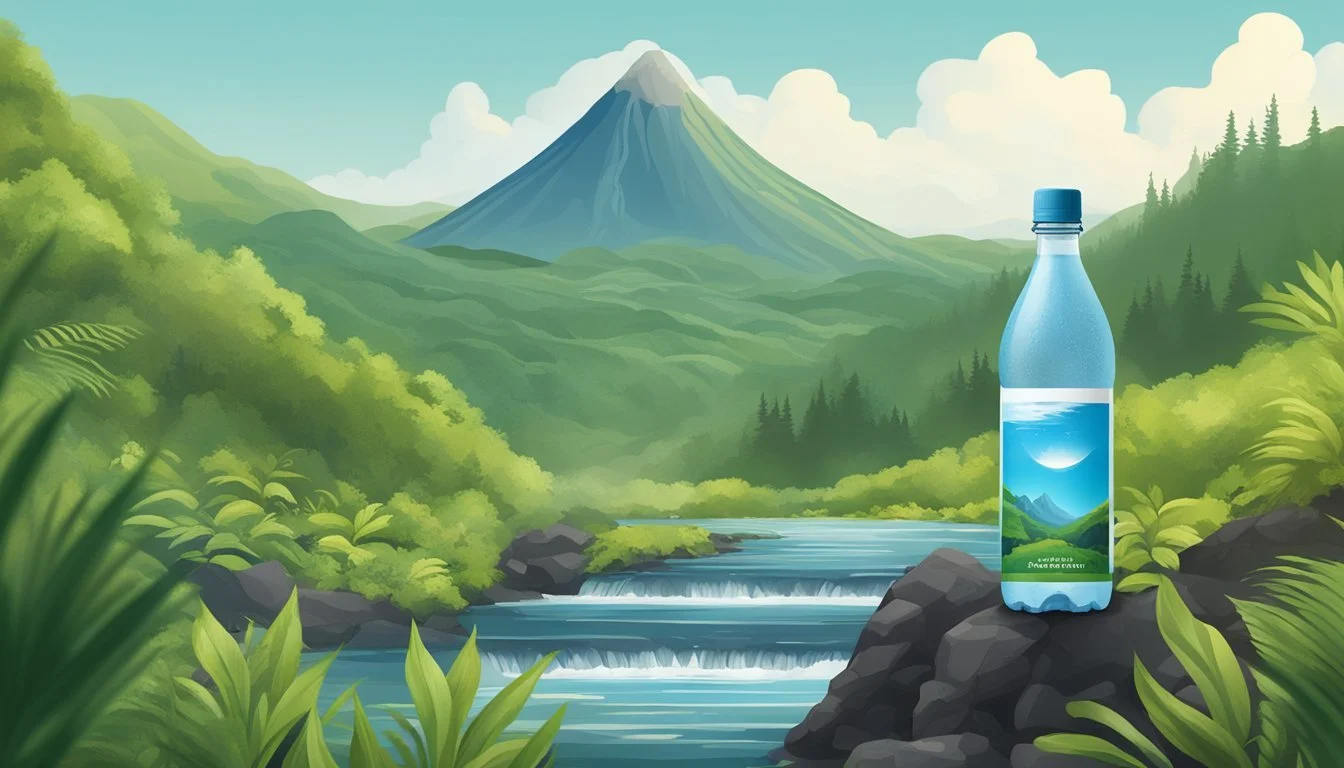Hawai’i Volcanic vs. Path
Which Bottled Water is Better?
Choosing the best bottled water can be a challenging decision with many brands vying for attention. Among them, Hawai’i Volcanic and Path have emerged as notable contenders. Hawai’i Volcanic water, originating from the Mauna Loa Volcano, is celebrated for its natural origins and the unique properties it acquires from this environment.
When comparing Hawai’i Volcanic water and Path, the primary difference lies in their pH levels and environmental impact. Hawai’i Volcanic offers naturally alkaline water with a pH ranging between 7.6 and 8.2, which helps neutralize acidity in the body. Path, on the other hand, targets eco-conscious consumers with its reusable aluminum bottles, emphasizing sustainability over specific mineral content or pH levels.
For those prioritizing health benefits, the naturally high alkaline pH of Hawai’i Volcanic makes it an attractive choice. Consumers looking for environmentally friendly packaging might prefer Path for its commitment to reducing plastic waste. By understanding the key benefits of each, readers can make an informed choice about which bottled water better aligns with their needs.
Overview of Hawai’i Volcanic and Path Water
Both Hawai’i Volcanic and Path Water have distinct origins and missions, focusing on sustainability and premium water quality. Key differences lie in their sourcing, environmental impact, and packaging.
History and Brand Mission
Hawai’i Volcanic is synonymous with high-quality, naturally filtered water sourced from the Mauna Loa volcano on the Big Island of Hawai’i. The brand emphasizes its commitment to sustainable practices and health benefits, promoting conservation efforts and educational opportunities through initiatives on their website, waiakea.com.
Path Water was founded with the mission of addressing the plastic pollution problem. By offering reusable aluminum bottles, Path aims to reduce single-use plastic waste. Available on platforms like Amazon and Whole Foods Market, the brand promotes a refill culture to decrease environmental impact.
Source and Origin
Hawai’i Volcanic sources its water from rain and snowmelt at the top of Mauna Loa. The shield formation of the volcano allows water to naturally filter through volcanic rock, enriching it with electrolytes and minerals. This process provides a naturally alkaline pH level ranging from 7.6 to 8.5, contributing to its distinct taste and health benefits.
Path Water doesn’t emphasize a specific geographic source for its water. Instead, the focus is on the purity and quality achieved through rigorous purification processes. This approach ensures a consistent taste and quality regardless of the refill location, appealing to consumers across various regions.
Sustainability and Environmental Impact
Hawai’i Volcanic places a strong emphasis on sustainability. The company uses 100% recycled plastic for its bottles and runs its local facility on renewable energy. They also support conservation projects and provide educational opportunities in Malawi, Africa, demonstrating a broader commitment to global environmental health.
Path Water leverages its aluminum packaging as a sustainable alternative to single-use plastic bottles. The brand encourages a refill-and-reuse culture, positioning itself as a leader in reducing plastic waste. Their environmental efforts are visible through partnerships and initiatives aimed at conserving natural resources and promoting a zero-waste lifestyle.
Both brands highlight significant efforts in sustainability and environmental responsibility, making them front-runners in the premium bottled water market. Through their unique approaches, they offer consumers choices that align with environmental and health-conscious values.
Composition and Health Benefits
Both Hawai’i Volcanic and Path bottled waters offer unique compositions and health benefits. The key differences lie in their mineral content, pH levels, and overall hydration benefits.
Mineral Content and Electrolytes
Hawai’i Volcanic water is sourced from Mauna Loa volcano, where the water passes through porous volcanic rock. This natural filtration enriches the water with minerals like silica, calcium, potassium, and magnesium. These minerals are essential for maintaining bone, hair, skin, and nail health.
Path water is purified and infused with electrolytes, although specifics on mineral content may vary by batch. Minerals and electrolytes are crucial in maintaining electrolyte balance, supporting muscle function, and aiding hydration.
Alkalinity and pH Levels
Hawai’i Volcanic has a naturally alkaline pH ranging from 7.6 to 8.5, primarily due to the volcanic filtration process. This pH level helps in neutralizing acidity in the body, potentially providing benefits such as improved bone health and reduced acid reflux.
Path water aims for a balanced pH level, typically close to neutral (approximately 7). While not specifically marketed as alkaline water, it can still contribute to maintaining a healthy pH balance in the body.
Hydration and Health Advantages
Both Hawai’i Volcanic and Path emphasize the importance of hydration. The mineral content and electrolytes in Hawai’i Volcanic can enhance hydration by replenishing essential nutrients lost during physical activities. This can support overall health by promoting better circulation and digestion.
Path's primary focus is on pure hydration, ensuring clean and refreshing water. While it may have fewer minerals compared to Hawai’i Volcanic, its electrolyte content helps maintain hydration without any added sugars or additives.
Each water type offers unique benefits tailored to different health needs, with Hawai’i Volcanic leaning towards mineral-rich hydration and Path focusing on purified and balanced hydration.
Production Methods and Quality
Both Hawai’i Volcanic and Path Water prioritize sustainable production and high water quality. Their approaches to filtration, purity, and material usage in packaging highlight their environmental commitments.
Filtration and Purity
Hawai’i Volcanic water is sourced from the slopes of Hawaiian volcanoes, where it undergoes natural filtration through volcanic rock. This process gives the water its distinctive taste and an alkaline pH of 7.6 to 8.2. The natural filtration helps remove many contaminants, ensuring a high level of purity.
Path Water, a purified water brand, utilizes advanced filtration methods that include reverse osmosis and UV treatment. These processes ensure that the water is free from common contaminants like nitrates and other impurities, guaranteeing consumers a clean and safe drinking experience. The stringent purification ensures consistent purity.
Packaging and Material Usage
Hawai’i Volcanic employs rPET for their bottles, ensuring they are BPA-free and made from recycled materials. This practice aligns with their sustainability commitment, as they bottle less than 0.003% of the water yielded naturally. The eco-friendly packaging contributes to reducing plastic waste and supports environmental conservation.
Path Water champions the use of aluminum bottles, which are both reusable and recyclable. These BPA-free containers provide a durable solution for reducing single-use plastic waste. The brand also supplies Hydration Stations to support organizations aiming to ban plastic bottled water, further emphasizing their dedication to sustainability and clean water access.
By using these distinct methods and materials, both brands demonstrate a commitment to quality and environmental stewardship.
Taste Profile and Consumer Preferences
Hawai’i Volcanic and Path offer distinct taste profiles and have garnered different consumer preferences. These differences are primarily due to their unique mineral content and sourcing methods, making each suitable for various consumer needs, including athletes and premium water enthusiasts.
Palate and Flavor Notes
Hawai’i Volcanic water is known for its naturally alkaline composition, resulting in a smooth and slightly sweet taste. The water is filtered through volcanic rock, which enriches it with minerals such as calcium and magnesium. This unique filtering process gives it a rich, full-bodied flavor that is often described as soft and refreshing.
Path, on the other hand, focuses on providing purified water with a clean and crisp taste. It undergoes a rigorous purification process that strips away impurities, leading to a more neutral and straightforward flavor profile. This makes Path appealing to those who prefer a clean, unobtrusive taste without additional mineral characteristics.
Consumer Taste Tests and Reviews
Consumer reviews highlight the distinct preferences between the two brands. Hawai’i Volcanic often receives praise for its silky texture and slightly sweet finish, making it a favorite among premium water connoisseurs and athletes who appreciate its mineral-rich content. Its naturally sourced, mineral-infused nature appeals to those looking for water that offers more than just hydration.
Path's purified water is lauded for its consistency in taste and quality. Reviews often mention its clean and crisp profile, which resonates well with consumers who prefer minimalistic and straightforward water. This simplicity appeals to a broad audience, including those who prioritize consistent taste and purity in their bottled water choices.
Economic and Brand Considerations
Both Hawai’i Volcanic and Path offer distinct economic advantages and brand partnerships that influence their positioning in the market. Attention to cost-effectiveness, market presence, and strategic collaborations play crucial roles in their overall appeal.
Cost and Value Proposition
Hawai’i Volcanic features higher-end pricing due to its premium positioning and natural filtration process through volcanic rock. The water’s naturally alkaline properties and commitment to sustainability enhance its perceived value despite the cost. Subscription options on Waiakea.com offer savings and convenience.
Path provides a more budget-friendly alternative. Its reusable aluminum bottles reduce long-term costs for consumers. Shipping costs vary, but competitive rates on platforms like Amazon make it easily accessible.
Market Presence and Availability
Hawai’i Volcanic has an extensive presence in premium retail chains such as Whole Foods Market. It is also available for direct purchase on Waiakea.com and other e-commerce platforms. This wide availability makes it a convenient option for consumers seeking specific health benefits.
Path focuses on broader market penetration. The brand is available in a wide range of stores and online platforms like Amazon. Its emphasis on reusability and eco-friendliness appeals to a wider audience, from everyday shoppers to environmentally conscious consumers.
Brand Partnerships and Collaborations
Hawai’i Volcanic has established numerous partnerships. The brand donates over 5% of its revenue to non-profits involved in environmental protection and education, enhancing its community impact and brand image.
Path collaborates with various educational campaigns and sustainability initiatives. These partnerships emphasize their commitment to reducing plastic waste and promoting environmental stewardship. Such collaborations not only boost market visibility but also resonate with eco-conscious consumers.
While Hawai’i Volcanic and Path offer unique benefits and challenges, their economic and brand considerations reveal distinct strategies to attract and retain customers. Whether through premium pricing or widespread availability, each brand brings something valuable to the bottled water market.
More About Hawai’i Volcanic
Acqua Pana vs Hawaii Volcanic: Which Bottled Water is Better?
Antipodes vs Hawaii Volcanic: Which Bottled Water is Better?
Aqua Carpatica vs Hawaii Volcanic: Which Bottled Water is Better?
Arrowhead vs Hawaii Volcanic: Which Bottled Water is Better?
Boxed Water vs Hawaii Volcanic: Which Bottled Water is Better?
Castle Rock vs Hawaii Volcanic: Which Bottled Water is Better?
Core Hydration vs Hawaii Volcanic: Which Bottled Water is Better?
Deer Park vs Hawaii Volcanic: Which Bottled Water is Better?
Hawaii Volcanic vs 1907water: Which Bottled Water is Better?
Hawaii Volcanic vs Alkaline88: Which Bottled Water is Better?
Hawaii Volcanic vs Big Chill: Which Bottled Water is Better?
Hawaii Volcanic vs BodyArmor: Which Bottled Water is Better?
Hawaii Volcanic vs Cascade Mountain: Which Bottled Water is Better?
Hawaii Volcanic vs CBD Living: Which Bottled Water is Better?
Hawaii Volcanic vs Crystal Geyser: Which Bottled Water is Better?
Hawaii Volcanic vs Crystal Lake: Which Bottled Water is Better?
Hawaii Volcanic vs Essence pH10: Which Bottled Water is Better?
Hawaii Volcanic vs Kirkland Signature: Which Bottled Water is Better?
Hawaii Volcanic vs Liquid Death: Which Bottled Water is Better?
Hawaii Volcanic vs Open Water: Which Bottled Water is Better?
Hawaii Volcanic vs Proud Source: Which Bottled Water is Better?
Hawaii Volcanic vs Pure Life: Which Bottled Water is Better?
Hawaii Volcanic vs Purely Sedona: Which Bottled Water is Better?
Hawaii Volcanic vs Richard's Rainwater: Which Bottled Water is Better?
Hawaii Volcanic vs Simple Truth: Which Bottled Water is Better?
Hawaii Volcanic vs Talking Rain AQA: Which Bottled Water is Better?
Hawaii Volcanic vs Weird Water: Which Bottled Water is Better?
Hawaii Volcanic vs Whole Foods 365: Which Bottled Water is Better?
Hawaii Volcanic vs Whole Foods Italian Still Mineral water: Which Bottled Water is Better?
Hawaiian Springs vs Hawaii Volcanic: Which Bottled Water is Better?
Ice Mountain vs Hawaii Volcanic: Which Bottled Water is Better?
Icelandic Glacial vs Hawaii Volcanic: Which Bottled Water is Better?
Just Water vs Hawaii Volcanic: Which Bottled Water is Better?
Mountain Valley Spring Water vs Hawaii Volcanic: Which Bottled Water is Better?
Nestle Pure Life vs Hawaii Volcanic: Which Bottled Water is Better?
Poland Spring vs Hawaii Volcanic: Which Bottled Water is Better?
San Pellegrino vs Hawaii Volcanic: Which Bottled Water is Better?
Smartwater vs Hawaii Volcanic: Which Bottled Water is Better?
Solan de Cabras vs Hawaii Volcanic: Which Bottled Water is Better?
Topo Chico vs Hawaii Volcanic: Which Bottled Water is Better?
Zephyrhills vs Hawaii Volcanic: Which Bottled Water is Better?





